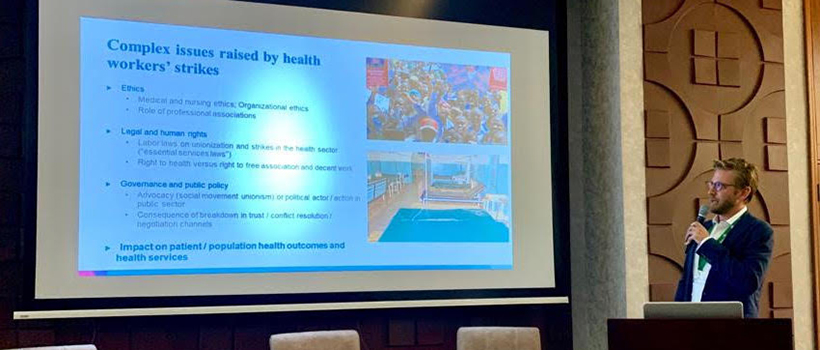- Home
- Humanrights
- Projects
- Labor Rights
Labor Rights

Human Rights, Labor and Solidarity in Latin America
Steve Striffler, Director of the Labor Studies Program and the Labor Resource Center, is exploring the impact that the emergence of human rights as a discourse and set of practices had on Latin American solidarity in general, and left internationalism in particular, during the post-WWII period. This research is forthcoming in Solidarity: Latin America and Left Internationalism in the Era of Human Rights, to be published by Pluto Press.
In this book, Professor Striffler suggests that the ascent of human rights within Latin American solidarity was possible not only because it offered a compelling way of confronting forms of violence that could be tied to US actors and policies, but because it was not a form of left internationalism – an internationalism premised on the notion that collective struggle is undertaken with the goal of generating deep transformation. As mainstream human rights became rooted in the professional collection and distribution of information about human rights abuses, it actively distanced itself from political projects of any kind, including those of so-called human rights victims. In order to be seen as a neutral, objective, observer, one that could be trusted to reliably identify and denounce human rights abuses, human rights organizations actively divorced themselves from any politics, but particularly from an identifiably left politics. It was the very limited nature of this political project – one that did not so much challenge the Cold War consensus as re-affirm it -- that allowed human rights to not only survive during the Cold War, but blossom through it.
This was important for the long-term trajectory of international solidarity, including labor solidarity. It was not simply that human rights marginalized or replaced other forms of internationalism, but that its emergence displaced a range of internationalisms that assumed collective struggle would fundamentally change the world with a form of solidarity that was actively divorced from transformative political projects altogether. This transformation was never complete, and more radical understandings and uses of human rights certainly persisted, but it nevertheless altered the political calculus while limiting the horizon of international solidarity.
Decent Work in the Holistic Human Rights Framework
Associate Professor Gillian MacNaughton collaborates with Dr. Diane F. Frey on several projects focused on the right to decent work. Their research falls into two general streams. First, they examine the MDG and SDG goals, targets and indicators related to full employment and decent work from both ILO social justice and human rights perspectives. This work is published in a series of articles in the Journal of Workplace Rights, Georgetown Journal of International Law, and Hastings Race and Poverty Law Journal, as well as a book chapter “Full employment and decent work in the post-2015 development agenda” in N. Shawki (ed), International Norms, Normative Change, and the UN Sustainable Development Goals (pp. 185-199). Plymouth, UK: Rowman & Littlefield Publishers Second, they examine the right to decent work as interrelated, interdependent, and indivisible from other human rights. This work appears in "Decent Work for All: A Holistic Human Rights Approach" in the American University International Law Review. They are currently working on an article that considers the right to decent work as a social determinant of health.
The Right to Decent Work and the Global Health Care Workforce Crisis
Michael L. Scanlon, MPH, MA, a current PhD student in Global Governance and Human Security is researching the right to decent work for health care workers. Using the International Labour Organization’s Decent Work Agenda (1999), including rights at work, fostering employment, social protection, and social dialogue, he argues that violations of the right to decent work in health settings are a significant contributor to the global health workforce crisis. He focuses on the right to decent work in the context of low (or no) pay, dangerous working conditions, and laws against unionization and striking, which contribute to health workers leaving health settings where they are needed most – i.e., public systems, rural areas, and lower-income countries. The aim of his project is to illustrate productive human rights synergies between the right to decent work and the right to health in the context of the global health workforce crisis.